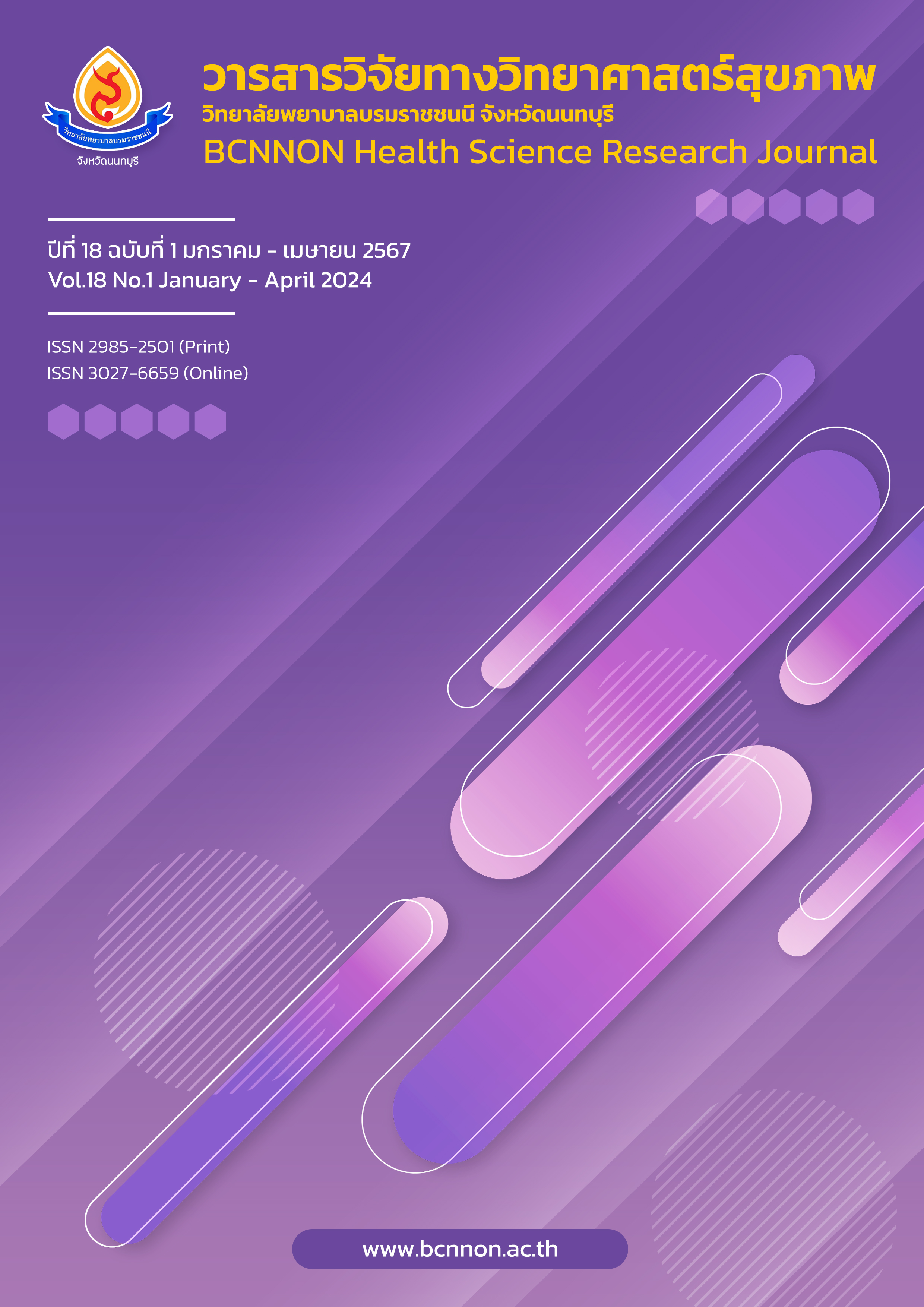The role of nurses in promoting family resilience of children with chronic illness
Main Article Content
Abstract
Chronic illness in children not only affects the child physically and mentally, but also the family by having to face various challenges and uncertainties as a result of the illness. If the family is able to face and manage the problems, they can return to normality. This will ensure that sick children and their families have a good quality of life, even if they are confrented with the difficult situation of a chronic illness. Family resilience is an important process that enables families to care for sick children and supports each family member to tackle and overcome problems together and maintain their family functioning. Understanding the concept and importance of family resilience is important for healthcare professionals, especially nurses, to support families with chronically ill children. This article aims to present the concept of family resilience and explain how to promote family resilience in children with chronic illness. This will provide guidelines for nurses in caring for children with chronic illnesses and their families to achieve a better quality of life.
Downloads
Article Details

This work is licensed under a Creative Commons Attribution-NonCommercial-NoDerivatives 4.0 International License.
บทความที่ได้รับการตีพิมพ์เป็นลิขสิทธิ์ของวิทยาลัยพยาบาลบรมราชชนนี จังหวัดนนทบุรี
ข้อความที่ปรากฏในบทความแต่ละเรื่องในวารสารวิชาการเล่มนี้เป็นความคิดเห็นส่วนตัวของผู้เขียนแต่ละท่านไม่เกี่ยวข้องกับวิทยาลัยพยาบาลบรมราชชนนี จังหวัดนนทบุรี และคณาจารย์ท่านอื่น ในวิทยาลัยฯ แต่อย่างใด ความรับผิดชอบองค์ประกอบทั้งหมดของบทความแต่ละเรื่องเป็นของผู้เขียนแต่ละท่าน หากมีความผิดพลาดใด ๆ ผู้เขียนแต่ละท่านจะรับผิดชอบบทความของตนเองแต่ผู้เดียว
References
Qiu Y, Xu L, Pan Y, He C, Huang Y, Xu H, et al. Family resilience, parenting styles and psychosocial adjustment of children with chronic illness: a cross-sectional study. Front Psychiatry. 2021; 12:646421. doi: 10.3389/fpsyt.2021.646421.
Cobham VE, Hickling A, Kimball H, Thomas HJ, Scott JG, Middeldorp CM. Systematic review: anxiety in children and adolescents with chronic medical conditions. J Am Acad Child Adolesc Psychiatry. 2020;59(5):595-618. doi: 10.1016/j.jaac.2019.10.010.
Ferro MA, Boyle MH. The impact of chronic physical illness, maternal depressive symptoms, family functioning, and self-esteem on symptoms of anxiety and depression in children. J Abnorm Child Psychol. 2015;43(1):177-87. doi: 10.1007/s108 02-014-9893-6.
Puka K, Tavares TP, Anderson KK, Ferro MA, Speechley KN. A systematic review of quality of life in parents of children with epilepsy. Epilepsy Behav. 2018;82:38-45. doi: 10.1016/j.yebeh. 2018.03.008.
Petrongolo JL, Zelikovsky N, Keegan RM, Furth SL, Knight A. Examining uncertainty in illness in parents and children with chronic kidney disease and systemic lupus erythematosus: a mediational model of internalizing symptoms and health-related quality of life. J Clin Psychol Med Settings. 2020;27(1):31-40. doi: 10.1007/s10880-019-09617-3.
Sulkers E, Tissing WJ, Brinksma A, Roodbol PF, Kamps WA, Stewart RE, et al. Providing care to a child with cancer: a longitudinal study on the course, predictors, and impact of caregiving stress during the first year after diagnosis. Psychooncology. 2015; 24(3):318-24. doi: 10.1002/pon. 3652.
Caicedo C. Families with special needs children: family health, functioning, and care burden. J Am Psychiatr Nurses Assoc. 2014;20(6):398-407. doi: 10.1177/1078390314561326.
Dong C, Wu Q, Pan Y, Yan Q, Xu R, Zhang R. Family resilience and its association with psychosocial adjustment of children with chronic illness: a latent profile analysis. J Pediatr Nurs. 2021;60:e6-e12. doi: 10.1016/j.pedn.2021.02.010.
Fernandez IT, Schwartz JP, Chun H, Dickson G. Family resilience and parenting. In: Becvar D, editor. Handbook of family resilience. New York, NY: Springer; 2013.
Luo YH, Li WHC, Cheung AT, Ho LLK, Xia W, He XL, et al. Relationships between resilience and quality of life in parents of children with cancer. J Health Psychol. 2022;27(5):1048-56. doi: 10.1177/1359105321990806.
Reed M, Bedard C, Perlman CM, Browne D, Ferro MA. Family functioning and health-related quality of life in parents of children with mental illness. J Child Fam Stud. 2023:1-12. doi: 10.1007/s10826-023-02556-6.
Van Schoors M, Caes L, Verhofstadt LL, Goubert L, Alderfer MA. Systematic review: family resilience after pediatric cancer diagnosis. J Pediatr Psychol. 2015; 40(9):856-68. doi: 10.1093/jpepsy/jsv055
Park M, Choi EK, Lyu CJ, Han JW, Hahn SM. Family resilience factors affecting family adaptation of children with cancer: a cross-sectional study. Eur J Oncol Nurs. 2022;56:102078. doi: 10.1016/j.ejon.2021.102078
Park M, Choi EK, Lee HJ, Park HE, Chinbayar A. Resilience-promoting programs in families of children with cancer: a systematic review. J Pediatr Hematol Oncol Nurs. 2022;39(3):185-201. doi: 10.1177/27527530211055997.
Rosenberg AR, Bradford MC, Junkins CC, Taylor M, Zhou C, Sherr N, et al. Effect of the promoting resilience in stress management intervention for parents of children with cancer (PRISM-P): a randomized clinical trial. JAMA Netw Open. 2019;2(9):e1911578. doi: 10.1001/jamanetworkopen.2019.11578.
Rosenberg AR, Zhou C, Bradford MC, Barton K, Junkins CC, Taylor M, et al. Parent perspectives after the PRISM-P randomized trial: a mixed-methods analysis. J Palliat Med. 2021; 24(10): 1505-15. doi: 10.1089/jpm.2020.0720.
Van Schoors M, Caes L, Verhofstadt LL, Goubert L, Alderfer MA. Systematic review: family resilience after pediatric cancer diagnosis. J Pediatr Psychol. 2015; 40(9):856-68. doi: 10.1093/ jpepsy/jsv055.
Lin F-Y, Rong J-R, Lee T-Y. Resilience among caregivers of children with chronic conditions: a concept analysis. J Multidiscip Healthc. 2013;6:323-33. doi: 10.2147/JMDH.S46830.
Walsh F. Family resilience: a framework for clinical practice. Fam Process 2003;42(1):1-18. doi: 10.1111/j.1545-5300.2003.00001.x.
Walsh F. Family resilience: a developmental systems framework. Eur J Dev Psychol. 2016;13(3):313-24. doi: 10.1080/17405629.2016.1154035.
Chow TS, Tang CSK, Siu TSU, Kwok HSH. Family resilience scale short form (FRS16): validation in the US and Chinese samples. Front Psychiatry. 2022:13: 845803. doi: 10.3389/fpsyt.2022.84580.


